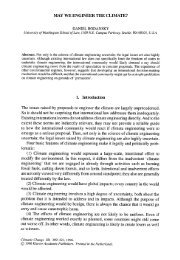ThorEA - Towards an Alternative Nuclear Future.pdf
ThorEA - Towards an Alternative Nuclear Future.pdf
ThorEA - Towards an Alternative Nuclear Future.pdf
Create successful ePaper yourself
Turn your PDF publications into a flip-book with our unique Google optimized e-Paper software.
William J. Nuttall is a University Senior Lecturer in Technology Policy at the University of Cambridge. In 1987 he won a<br />
Fulbright Post-Graduate Student Award to the Massachusetts Institute of Technology to study for a PhD in physics awarded<br />
in 1993. Returning to the UK he took two post doctoral research positions in large-facility physics using x-ray <strong>an</strong>d neutron<br />
scattering to study phase tr<strong>an</strong>sitions in diverse systems including actinide magnets. In 1997 Dr Nuttall moved to the London<br />
headquarters of the Institute of Physics where he later became M<strong>an</strong>ager, Policy. At the IOP he worked on a wide r<strong>an</strong>ge of<br />
physics-based policy issues including energy. In early 2002 he moved to Cambridge University to be founding Course Director<br />
for a new Cambridge-MIT Institute (CMI) sponsored master’s degree in Technology Policy. He holds a shared post between<br />
Judge Business School, where he is based, <strong>an</strong>d Cambridge University Engineering Department. He is the author of the book<br />
<strong>Nuclear</strong> Renaiss<strong>an</strong>ce (Taylor & Fr<strong>an</strong>cis 2005), co-editor of the book <strong>Future</strong> Electricity Technologies <strong>an</strong>d Systems (CUP 2006),<br />
co-editor of a special issue of the journal Progress in <strong>Nuclear</strong> Energy concerning long-term m<strong>an</strong>agement options for separated<br />
civil plutonium (2007). Dr Nuttall has a leading role in the ESRC Electricity Policy Research Group. He has assisted the UK<br />
Parliamentary Office of Science <strong>an</strong>d Technology <strong>an</strong>d the International Energy Agency. He has given oral evidence on nuclear<br />
power to the UK House of Commons Trade <strong>an</strong>d Industry Select Committee.<br />
Hywel Owen is a Lecturer in Physics at the University of M<strong>an</strong>chester, with 15 years experience in the design, construction, <strong>an</strong>d<br />
operation of particle accelerators. He was a co-designer of the DIAMOND storage ring – the largest accelerator facility in the<br />
UK, <strong>an</strong>d successfully operating since 2006 – <strong>an</strong>d has been closely involved in the accelerator design of every light source facility<br />
pl<strong>an</strong>ned or built in the UK (SRS, 4GLS, ALICE, <strong>an</strong>d the New Light Source). He presently sits on the committees of the Particle<br />
Accelerators <strong>an</strong>d Beams Group <strong>an</strong>d Chartered Physicist Review P<strong>an</strong>el of the Institute of Physics, <strong>an</strong>d has been chief editor of the<br />
Europe<strong>an</strong> Particle Accelerator Conference.<br />
Geoff Parks is a University Senior Lecturer in <strong>Nuclear</strong> Engineering in the Department of Engineering at Cambridge University.<br />
He received his BA in Engineering from the University of Cambridge in 1984 <strong>an</strong>d his PhD in <strong>Nuclear</strong> Engineering in 1989. He was<br />
subsequently elected to a Research Fellowship at Jesus College, Cambridge, <strong>an</strong>d then became a Senior Research Associate at<br />
Cambridge University Engineering Department, funded by <strong>Nuclear</strong> Electric plc. He became a University Lecturer at the start of<br />
1996. He was promoted to Senior Lecturer in J<strong>an</strong>uary 2004. Dr Parks heads the Computational Design Group in the Cambridge<br />
Engineering Design Centre, which researches into the application of adv<strong>an</strong>ced optimisation methods to difficult real-world<br />
problems in a wide variety of application areas including aerodynamic, nuclear <strong>an</strong>d structural engineering, in the development<br />
<strong>an</strong>d application of multi-objective optimisation methods, <strong>an</strong>d in the effective exploitation <strong>an</strong>d integration of optimisation<br />
methods within the Engineering Design process. Dr Parks has long-st<strong>an</strong>ding interests in nuclear reactor operation <strong>an</strong>d control<br />
with particular expertise in in-core fuel m<strong>an</strong>agement, <strong>an</strong>d helped develop the code used by British Energy to design reload<br />
cores for Sizewell B. He has more recently developed interests in the use of accelerator driven systems for waste tr<strong>an</strong>smutation<br />
<strong>an</strong>d power generation <strong>an</strong>d in gas turbine based power generation cycles.<br />
Steven Steer is a fundamental nuclear physicist; he earned his PhD researching at the University of Surrey in coordination with<br />
international programs at world-leading accelerator facilities for the study of heavy-nuclei. He served 2 years as a member of<br />
the Institute of Physics nuclear physics group committee. He is currently a research associate at the University of Cambridge<br />
Engineering Department <strong>an</strong>d a member of the Electricity Policy Research Group, where he is evaluating ADSR technology with<br />
consideration of both technology <strong>an</strong>d economics.<br />
A report prepared by: the thorium energy amplifier association 71



